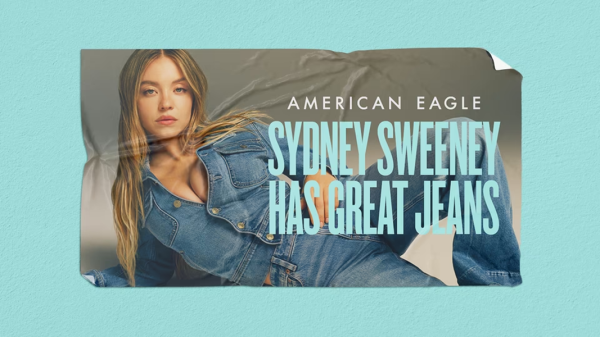Bathwater, soap and jeans. These words are seemingly very different yet somehow connected by one person: Sydney Sweeney. Sweeney is an American actress and producer best known for her role on “Euphoria” as Cassie Howard, an insecure high schooler with abandonment issues that leads her into toxic relationships and constantly seeking her partner’s approval.
In June 2025, Sweeney’s collaboration with Dr. Squatch, a soap company, came to fruition when she launched a limited-edition “Sydney’s Bathwater Bliss” soap.
Yes, Sweeney’s bathwater is listed in the ingredients list.
Dr. Squatch stated on their website on a now deleted page that the soap is made with a very small amount of sanitized bathwater that went through rigorous safety testing.
The collaboration idea came from the internet response to an ad that the star did for Dr. Squatch in October 2024 where she calls her viewers “dirty little boys” to promote Dr. Squatch’s natural body wash. Many commentators wanted soap with Sweeney’s bathwater included. Sweeney and Dr. Squatch then decided to give viewers “what they want.” At $8 per bar, the soap sold out in seconds and is now on resale websites like StockX and eBay for upwards of $1,600.
Whether it’s the usage of words like “boys,” “guys” and “men” in their ads, or the fact that Dr. Squatch wrote on their website that their products are formulated specifically for men, there is no denying that this soap is geared toward the male gaze. It’s painfully obvious that Sweeney and Dr. Squatch knew what they were doing.
Throughout her life, Sweeney has constantly been sexualized, whether that’s by the media or her high school peers. With Sweeney, I understand her frustration of being sexualized or commented on purely based on her appearance. Especially with today’s cutthroat internet, there’s not much she can do to stop it, so why not lean into it? If Sweeney is going to be sexualized by the public, why not make some money off of it?
Now, do I personally welcome the idea of rubbing someone’s bathwater over myself? Absolutely not. But again, who am I to judge Sydney Sweeney for trying to make some money off society’s unwavering and uncontrollable sexualization of her body?
With the sexualization of females, I feel we’re expected to vehemently commend it, no matter the conditions. We’ve seen how the public is, they don’t care about our feelings, they’ll just keep doing what they’re best at: sharing opinions and cultivating false narratives.
In July 2025, American Eagle released an ad featuring Sweeney. The tagline is “Sydney Sweeney has great jeans.” Sweeney says, “Genes are passed down from parents to offspring, often determining traits like hair color, personality and even eye color. My jeans are blue.” Undeniably, Sweeney and American Eagle use “jeans” and “genes” interchangeably.

Sweeney, as a blonde, blue-eyed, white woman represents the quintessential look of Western beauty standards. Many viewers have interpreted Sweeney, as a white woman, talking about how great her genes are as an indication of white privilege and the idea that Western features are superior.
Though I feel that this was not the message American Eagle or Sweeney wanted to convey, unfortunately, it is the one that viewers received. With anything posted on social media, effect outweighs intent. This is not a new concept, and seasoned brands like American Eagle and public figures like Sweeney who have been in the public eye for many years have no excuse to not know that effect will always outweigh intent. As someone with absolutely no experience in public relations, I could’ve seen from miles away that this ad did not send a message of empowerment or diversity.
Though Sweeney may never see this, I want to give her a few words of advice.
If you are reclaiming agency and self-determination of your sexualization want to play into the inevitable sexualization of your appearance that you unfortunately have no control over, then more power to you. Dictating the narrative of your objectification is important.
But I implore you to think about the young, diverse audience watching your every move. As a public figure, your every move is dissected, sifted through, sewn back together and then thrown right back at you. Every move you make is magnified, every photo you post is zoomed into, every video or ad you make is stopped at each frame. One wrong move, and it’s over, but one right move and you could empower women and girls across the world to tap into their femininity and counter unwanted sexualization by taking control of their own narrative.
So why not choose the latter?






